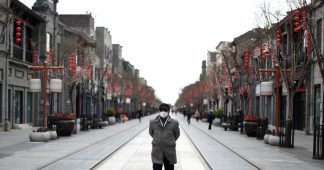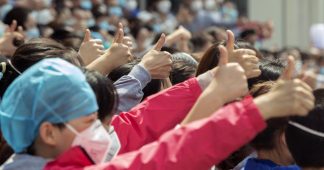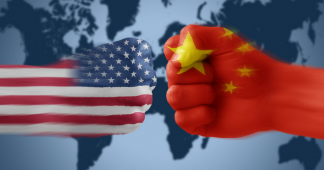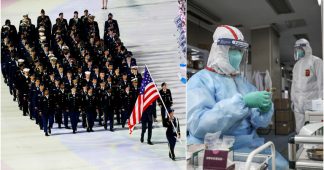By Adnan Akfırat
04/10/2020
While the US and Europe are destroyed by the Covid-19 outbreak, the question ”How did China stop the outbreak and turned back to normal life?” has become a frequent topic of discussion. Atlanticists’ answers are cursory: ”They’ve hidden the data.’’ The Western media, which has the most to lose from the end of the ”American Dream”, has started to act like kind of ”anti-China”. The fact that 95% of factories in China are already open drives them mad, especially considering that 240,000 are expected to die in the US. Bloomberg, CNN, and the New York Times are manufacturing materials opposing China, while provocational websites in Turkey such as Nevzat Çicek’s Independent Türkçe and Ruşen Çakır’s Medyascope promote similar materials. Regrettably, they haven even appeared in the state-owned TRT.
Conspiracy theories demonizing China and Xi Jinping are replete on social media sites like Whatsapp, Facebook and Twitter. They write the signatures of professors under conspiracy theories and use other strategies to spread false information.
24/7 on Duty
The secret of China’s success is indeed simple: the guidance of a science oriented, populist and pro-public state complete with a well-organized society. China’s organization and culture of discipline was key in their success. The neighborhood committees in China for instance, were conceived as the grassroot governing units, and are the most direct instrument for the people to participate in governance.
Wang Wenwen of the Global Times discussed how the “Neighborhood Committees” work in his article from March 31: ”Returning to my residential community after some grocery shopping, I adjust my mask and roll up a sleeve to expose a bare wrist. ‘Temperature check, resident’s pass please’, requested the masked official at the gate. For the past two months, this has been the new normal in Beijing. No one makes a fuss about it. It is an imperative for everyone in order to protect the city and my neighborhood from the coronavirus. Everyone follows it very well: if you’re sick and have a temperature, don’t ever think to go outside and spread the disease!”
What sets this order in shifts at the entrance of building site is the ‘Neighborhood Committee’, ‘juweihui-居委会’. They are at the entrance 24/7. All of them are volunteers. They take everyone’s temperature and work hard to prevent the disease from spreading. This order was maintained even in the freezing Beijing cold of February without a hitch.
The Neighborhood Committees watched over the people during the hardest days of China’s struggle against the virus. Being on alert against the possibility of a new wave of infection, the country’s most important line of defense is also these Neighborhood Committees. Although the outbreak was halted, they continue to take people’s temperatures.
MAO’S GIFT
The Neighborhood Committees started as urban grassroots in the 1950s. As the self-governance units of the people, they were institutionalized by the suggestion of Mao Zedong, the founder of Socialist China.
This first neighborhood committee were the 200 who registered to the Shangyangshi street of Hangzhou just after the establishment of the People’s Republic of China on 23 October 1949, all of whom went to the polls to elect the chairman of the neighborhood committee. At the end of 1980s, neighborhood committees were established in all cities of China. The members of the committees are elected by the registered households for three years. Elected Chairman and Secretary is confirmed by local governments. Formerly, retired people were often chosen for this duty, now, there are even chairmen who have PhD degrees. The lowest education level is a bachelor’s degree. Teenagers are often employed for various projects. The most important human source are the registered volunteers.
The responsibilities of Neighborhood Committees are:
-To instruct local residents about the Constitution, policies and laws,
-To collect the subscription of the apartment building and building site, and to mark the documents,
-To help supporting the legitimate rights of the residents,
-To protect public property,
-To organize community events and entertainment,
-Peacemaking on low-level disagreements,
-To help public safety,
-To govern hygiene in common areas,
-Care of the elderly and handicapped, education of young and the improvement of social security,
-To bring the needs of suggestions of citizens to the attention of the government.
The chairman of the committee is responsible for coordination. In every committee, there is one vice chairman. Each member of the committee is responsible for a specific field. Those who are assigned these duties are instructed for civil government, social welfare and support.
THEY LOST THEIR SWAY IN 90s
Then Neighborhood committee system was weakened and lost its sway between 1992-2002 during a swift and coarse enrichment period. Economic crimes had increased and there were disruptions in the security of the cities during these years. The bars in front of windows remain from those years as a memory of that moment in the past.
The economic development model of those years was export-oriented growth. By the 11th Five-Year Plan, neighborhood committees were also revived when the domestic market-oriented development model was adopted.
Starting in 2006, the Communist Party of China focused on improving neighborhood committees. The relation between economic model and public democracy is the subject of another paper.
DEEP AFFECTION FOR THE PEOPLE
Since Xi Jinping was elected as the General Secretary of the Communist Party of China, there have been great efforts to improve grassroot organizations. President Xi defines grassroot organizations as the fundamentals of socialism with Chinese characteristics. Xi Jinping said the following during a discussion with Shanghai delegation at the annual meeting of the National People’s Congress and Chinese People’s Political Consultative Conference, on Mach 5, 2014: “Without a solid foundation, the earth shakes and the mountains move. The focus of social governance must be on urban and communities. When community services and management capabilities are enhanced, communities become more stable. Real stability in China depends on our comrades who are working at the grassroots level.”
There is an old Chinese saying which goes “Without a solid foundation, the earth shakes and the mountains move.” President Xi frequently cites proverbs and Chinese classics, like Mao before him.
The General Secretary of the Communist Party of China made this call to grassroot organizations:
”First is affection for the people. In order to strengthen our feelings toward the people, it is necessary to hold a deep affection for them while conducting our work. The people’s concerns must be our concerns. The people’s worries must be our worries. We must tackle the difficulties that plague the people and strive to realize the hopes that they cherish. Only then would we be able to do a better job in this regard in communities. We can easily see from their fine examples that when you show the people more warmth, they respond with more affection, and when you do more for the people’s welfare, they have more confidence in you. Second is to look at things in the perspective of the people. When carrying out mass work, we should always maintain the staunch political position that the Party is built to serve the interests of the people and to govern on their behalf. As long as we put the people first and adhere to the mass line, doing a good job of mass work will never be too difficult. Third are the interests of the people. We must effectively realize, safeguard, and develop the interests of the people. Their interests must take precedence when deepening reforms, promoting development, and maintaining stability. We must always remember the hardships of the people, especially those whose situations are most dire and try to solve real problems and difficulties.”
MOBILIZATION AGAINST THE OUTBREAK
Neighborhood committees have come from the people themselves for decades and have been the smallest governmental units to provide order and governance in discipline. The more than 50 years of experience of the committees was activated when the COVID-19 threat emerged. This set the stage for the people to show their remarkable mobilization skills. The secret was the great discipline and labor mobilization of the neighborhood committees, which ensured 98% of the 11 million population of Wuhan underwent medical screening. They delivered the daily food needs of people who couldn’t go outside one by one. Most of the buildings in Wuhan are old and don’t have elevators. It would have been impossible to carry materials by stairs without neighborhood committees and volunteers. The work of the neighborhood committees in Jiangsu was on the news in the Chinese press. They knocked on every houses’ door to be sure the entire population had access to basic health and hygiene. Given the fact that they conducted this work at the risk of being sick, they were praised by society. The chairmen of neighborhood committees note that they receive an average of 600 phone calls a day.
CONCLUSION
Neighborhood committees help give a sense of belonging to a nation and provide a sense of safety to Chinese citizens. These committees let the people know that they have someone to consult when they are in need. The Neighborhood committees’ timely, careful and devoted work helped maintain social distancing during the outbreak and decreased the degree to which people needed to move around significantly, and therefore they prevented the spread of the virus. China has once again proven the wisdom of the saying: “the organized people cannot be defeated!”
* Adnan Akfirat is a Representative to China and Member of International Relations Bureau of Patriotic Party of Turkey; Chairman of Turkish-Chinese Business Development and Friendship Association (Turk-Cin Is Der); visitor researcher of Shanghai University Turkish Studies Center and Shihezi University Silk Road Research Center. Mr. Akfirat has been living in Shanghai since 2011.











